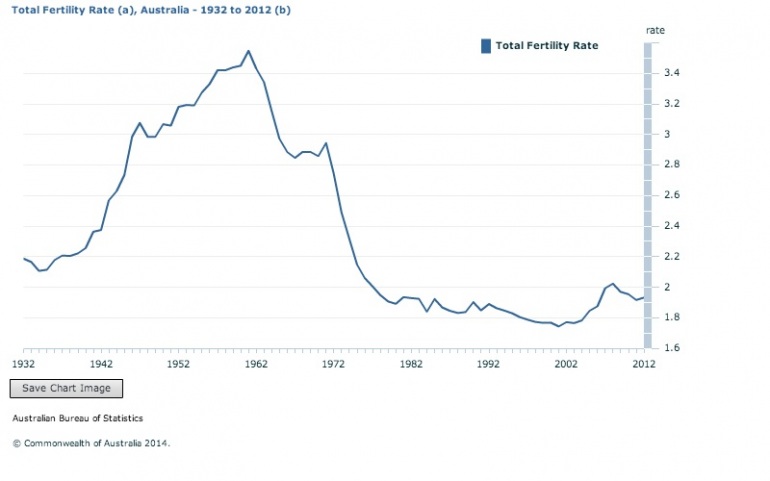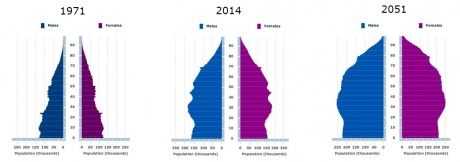Why Hockey's safe to debate pensions
In 2011, Time magazine reported on a python in the Everglades that had swallowed a 34-kilogram deer. While the unlucky ruminant produced a painful-looking bulge in the serpent, there was no suggestion it would not be digested.
Another bulge has been filling the front pages over the past couple of days: the demographic bulge that Treasurer Hockey has noticed moving through the Australian population.
And unlike the deer, it will be difficult to digest. Hence Hockey’s willingness to discuss the possibility of raising the pension age to around 70 to ensure Australia can meet its pension and health costs for all those extra oldies.
To see how that bulge moves over time, readers may like to play with the ABS’s excellent demographic profile animation tool. Those with more exciting things to do can just click on the image below showing Australia’s demographic profile in 1971, 2014 and 2050 respectively.
When a demographic profile flares out at the bottom like a pair of 1970s jeans, a nation is full of the joys of spring. Lots of youngsters will grow up, pay taxes, and look after their oldies when the time comes.
When the lower part of those charts tapers in -- like the tight trousers favoured by young Canberra political aides -- we have a problem. (Actually, two problems: the first is that the country is being run by 25-year-olds in tight pants.)
Demographically speaking, that inward taper means too few youngsters will grow up, pay taxes and look after the swelling grey armies of the future.
None of this is new, of course, but the Coalition is behaving as if it is, despite the fact that it was Peter Costello who got the five-yearly Intergenerational Reports rolling back in 1998. They’re all about the bulge and how to beat it.
One way is to bribe young Aussies to breed. Costello fathered such a scheme, when he upped family payments and urged parents to have “one for Mum, one for Dad, and one for Peter” (or something like that).
The combination of cash and Costello’s smooth-talking did the trick for a while and fertility rates rose (see chart below).
However, the Rudd ascendancy seemed to be some kind of turn-off, and fertility promptly fell again to well below two children per woman (the ‘replacement rate’ is around 2.2).

If Aussies won’t breed, we need to import and naturalise young people from abroad. However, as explained previously, the effect of young migrant families on Australia’s overall demographic profile is usually overstated (How I got it wrong on migration, December 6).
The third option is to make the young Australians of the future work harder and pay more taxes, or at least expect fewer benefits from the public purse. That’s where Hockey’s comments are focused -- raising the pension age is just one of the ways to slash future government expenditure.
As covered frequently by this columnist, there are numerous other ways to balance the books. They include broadening/raising the GST, ending negative gearing for residential housing (because it doesn’t achieve its goal of increasing the housing stock), ending generous superannuation tax concessions (because they push more of the tax burden onto the parents of young families), cutting back on family payments (particularly for higher income earners), not introducing Abbott’s $5.5 billion per year paid parental leave scheme, keeping carbon pricing and the broad-based revenue it collects, keeping the mining tax that will raise a useful amount in the longer term ... and all without hacking into health and education spending too much.
Phew.
But there is a problem. The bulge in the python doesn’t always look like a young deer. In political terms, the ravages of time will change it beyond recognition.
Thus, the youngsters born in the post-WWII ‘baby boom’ had strong political views when they hit voting age in the years either side of the ‘year of revolution’: 1968.
As Paul Strangio puts it in the newly published Cambridge History of Australia: “[In the late 1960s] like other western countries, Australia abounded with young people as the offspring of the post-war fertility boom hit adolescence and entered adulthood. It was not just their numbers that made this cohort conspicuous, but their outlook -- they were a generation of broad horizons, who believed their world was malleable to change.
“Material security was integral to this confidence: whereas the early lives of their parents had been blighted by Depression and war, the baby boomers had known only affluence.”
These young Australians have, since 1970, been heavily augmented in number by migrants, particularly as migrant intakes were raised from 100,000 a year in 2004 to between 200,000 and 300,000 in the years since.
However, the fact remains that the boomers of “broad horizons” who saw a world “malleable to change” are no longer 20. They’re more like 65, and looking to retire.
Long-haired kids who attended Vietnam moratorium marches, or turned out in “It’s time!” t-shirts to support the election of Gough Whitlam in 1972, are more likely to be thinking “It’s time ... to play golf!”
Perhaps this is what emboldens Hockey to start the pension age debate at this time. The boomer bulge is now too old to think it applies to them -- they are slipping into retirement with current settings in place.
And as for the youngsters, they are more likely to be voting Labor and Greens anyway. The latest Nielsen poll gives Labor a four percentage point lead over the Coalition in two-party-preferred terms, and a record-breaking 17 per cent primary vote to the Greens.
The politics of facing up to Australia’s growing demographic and fiscal problems will bear much more nuanced analysis going forward. For now, Hockey is gambling that enough Coalition voters are old enough to be on his side, and the young too busy to take much notice.
In time, of course, they will. Like their parents’ generation they will eventually realise, as the Roman poet Horace put it, that “we are but dust and shadow”.
Or less poetically, tomorrow’s python poo.














